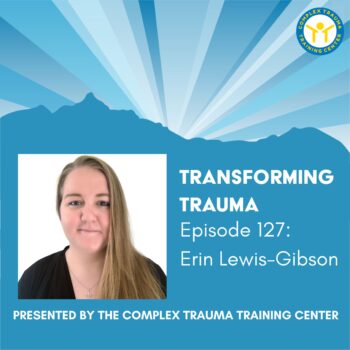Transforming Trauma Episode 127: Compassion and Consent in Treating Dissociative Identity Disorder With Erin Lewis-Gibson
A podcast brought to you by the Complex Trauma Training Center
Here’s a challenge that all mental professionals face: no provider is immune to misdiagnosing a client. This likelihood increases if that client presents with symptoms of Dissociative Identity Disorder (DID). Even an accurate, timely diagnosis and treatment of DID isn’t without its complications. Treating the disorder requires therapists to confront the often disturbing realities of a client’s trauma and the possibility of countertransference. But rather than become mired in self-doubt, or helplessness in the face of lack of understanding and available treatment and referral options, one therapist encourages her fellow clinicians to expand their curiosity and learning of DID. She invites the NARM principles of consent, relational attunement, and agency to guide this complex therapeutic relationship.
On this episode of Transforming Trauma, Emily Ruth welcomes back Erin Lewis-Gibson, MS, LCMHC. In addition to being a NARM Master Therapist and educator, Erin is CFO and co-owner of NC Cutting Edge Counseling, PLLC, a North Carolina-based practice specializing in dissociative disorders. Together, they explore the evolution of DID as a diagnosis and its treatment, the effects of social media on fictive personalities within a client’s organizing system, and Erin’s desire to reduce the global stigma attached to DID. Emily and Erin also discuss the positive impact that NARM has on creating a more consensual, relational and effective therapeutic environment, thus providing folks with DID the support they need to ensure their best quality of life.
“We’ve all misdiagnosed DID. While that can and does cause harm, I think we need to have compassion around this. I have DID, and I’ve misdiagnosed this before,” Erin confides, adding, “I mean, I’ve missed it completely!” As a result, she’s dedicated much of her career to providing clinicians with the practical knowledge they need to more accurately diagnose DID.
Erin favors a NARM-informed approach to treating DID because the modality provides clinicians with a framework by which they can hold space for self-inquiry without forcing agendas and outcomes onto the client. “[DID] is a complicated problem,” she concedes. “NARM is really great, here, to not pressure yourself to be everything for these clients. You just can’t.”
Transforming Trauma appreciates Erin’s openness, compassion, and commitment to educating clinicians on DID.
TRAINING OPPORTUNITY
We’re also pleased to announce NARM & Treating Dissociative Identity Disorder, Part 2: Exploring Relationships Between Self, Parts and NARM Therapist, an in-depth webinar featuring Erin Lewis-Gibson and hosted by CTTC Training Director Brad Kammer, LMFT, LPCC.
Register to join us live on Zoom:
February 29, 2024
10:00 AM – 12:00 PM Pacific Time
If you found this episode AFTER February 29, please click here to learn how you can access the recording.
MENTIONED IN THIS EPISODE
RECOMMENDED EPISODE
TT043: Using NARM to Decrease the Stigma of Dissociative Identity Disorder with Erin Lewis
GUEST CONTACT AND BIO
Erin Lewis-Gibson, MS, LCMHC, CFO, NARM Master Therapist is a dissociative disorders specialist living and working in North Carolina. She aims to educate therapists on how to diagnose and treat dissociative disorders and to reduce the global stigma of DID.

Subscribe for All Episodes
on your Favorite Service:
We want to connect with you!
Facebook @ComplexTraumaTrainingCenter
Twitter @CTTC_Training
YouTube
Instagram @cttc_training
Learn more about The Complex Trauma Training Center: http://www.complextraumatrainingcenter.com